As a devoted Maine Coon parent, you want nothing but the best for your feline friend. And when it comes to their diet, you want to make sure they’re getting all the nutrients they need to support their growth and development during their early years. That’s why kitten food is often the go-to choice for many cat owners – it’s packed with protein and calories that help fuel a kitten’s rapid growth. But as your Maine Coon starts to mature, you may be left wondering when it’s time to switch from kitten food to adult cat food.
Unfortunately, there’s no one-size-fits-all answer to this question. Every Maine Coon is unique and will have different nutritional needs based on factors like their size, weight, activity level, and overall health. But don’t worry – we’ve got you covered. In this blog post, we’ll explore the signs that indicate it may be time to transition your Maine Coon from kitten food to adult cat food.
Some of these signs include your cat’s age (typically around 12 months), weight (if they’re maintaining a healthy weight), energy level (if they seem less active), and appetite (if they’re eating less than usual). Of course, consulting with your veterinarian is always recommended before making any major changes to your pet’s diet.
In this post, we’ll also provide some helpful tips for making the transition easier on both you and your furry friend. From gradually introducing new foods to monitoring their progress along the way, we’ll cover everything you need to know about transitioning from kitten food to adult cat food.
So if you’re ready to give your Maine Coon the best possible care and nutrition they deserve, keep reading.
The importance of transitioning from kitten food to adult food
You want to make sure your Maine Coon is getting the right balance of nutrients at every stage of their life, and transitioning to adult food is a crucial step in their growth and development.
Kitten food is formulated specifically for the high energy and nutritional needs of growing kittens. However, as your Maine Coon matures, their nutritional requirements change, and they need a different type of food to maintain their health. This is why it’s essential to monitor your cat’s weight and overall health during this transition period to ensure that they are getting the nutrients they need.
Most veterinarians recommend transitioning your Maine Coon to adult food between 12 to 18 months of age. However, every cat is unique, and some may require a shorter or longer transition period. Consulting with your veterinarian can give you personalized recommendations for your Maine Coon’s nutrition needs.
One of the primary reasons for transitioning from kitten food to adult food is that kitten food is high in calories and may lead to obesity in adult cats. Overfeeding your Maine Coon with kitten food can cause them to gain too much weight, which can lead to several health problems such as joint issues, diabetes, and heart disease. Adult cat food has fewer calories than kitten food, making it more suitable for maintaining your Maine Coon’s weight as they mature.
Moreover, adult cat food has a different balance of nutrients than kitten food. Adult cats require a specific balance of vitamins, minerals, and other nutrients to maintain their health. Adult cat food is formulated with these requirements in mind and contains the right balance of nutrients that your Maine Coon needs.
When transitioning your Maine Coon to adult food, it’s essential to do so gradually over a period of 7-10 days. This will help prevent any digestive upset or stomach issues. Start by mixing a small amount of adult food into their kitten food and gradually increase the amount of adult food while decreasing the amount of kitten food.
When to transition Maine Coon cats to adult food
One crucial step in their growth and development is transitioning them from kitten to adult food. But when is the right time to make this transition? Let’s dive into the research.
Maine Coon cats are renowned for their impressive size, and as such, they may require more time on kitten food than other breeds. However, it’s important not to keep them on kitten food for too long as it may lead to health problems in the long run. Generally speaking, Maine Coons should be transitioned to adult food around 12 months of age.
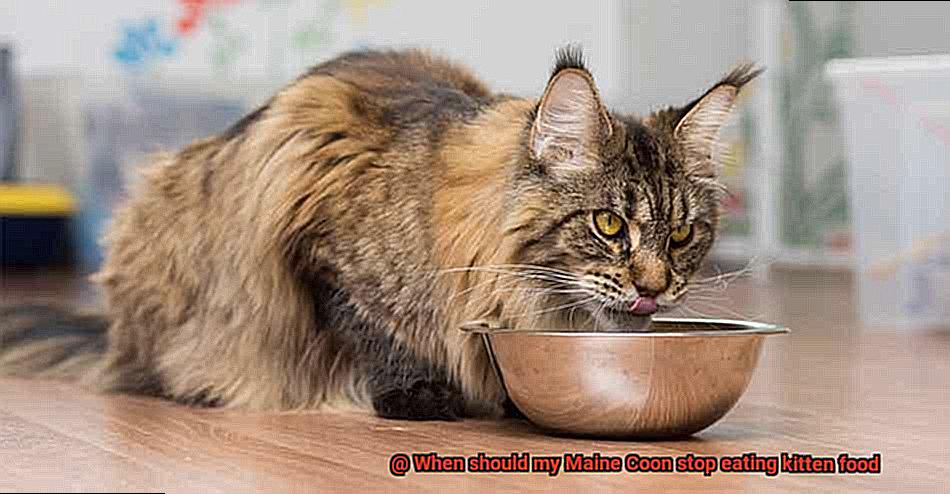
So, how do you know if your Maine Coon is ready for adult food? A good way to tell is by monitoring their weight. If your cat is maintaining a healthy weight on kitten food, it may be too soon to transition them to adult food. However, if they’re starting to pile on the pounds at a rapid rate, it may be time to make the switch.
Another essential factor to consider when transitioning your Maine Coon to adult food is their activity level. If your cat is highly active and burns a lot of calories, they may need to stay on kitten food a little longer than a less active cat. On the other hand, if your cat is relatively sedentary and not burning many calories, they may be ready for adult food sooner than you think.
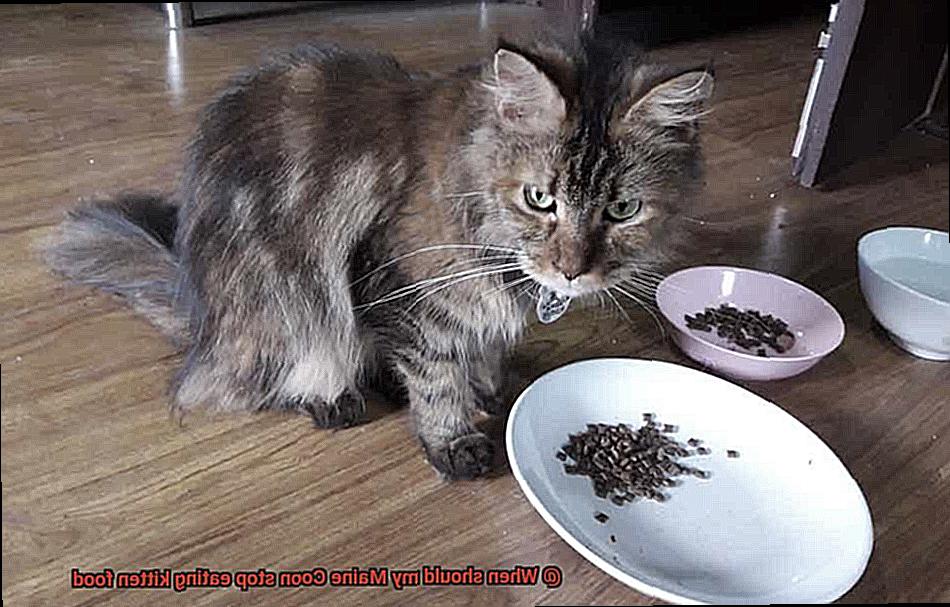
When making the transition to adult food, take it slow and steady. This means mixing a small amount of adult food in with their kitten food and gradually increasing the amount over several days or weeks. This will help prevent any digestive upset that may occur when switching foods too quickly.
Signs your Maine Coon is ready for adult food
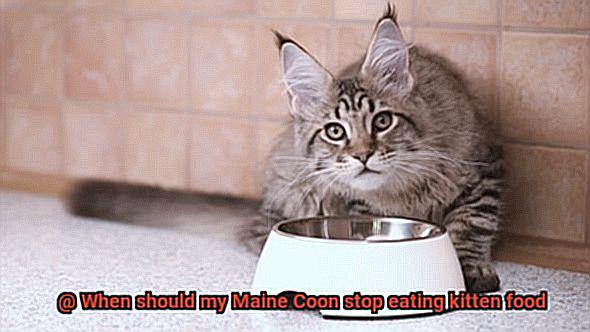
Knowing when to transition from kitten food to adult food is crucial in providing them with the necessary sustenance. But what indications should you look for to determine if your Maine Coon is ready for adult food?
Firstly, age is a significant factor in deciding when to make the switch. Typically, kittens should continue consuming kitten food until they reach one year old. However, each cat is unique and may be ready for adult food earlier or later.
Another key factor to consider is your Maine Coon’s size and weight. As one of the largest breeds of cats, Maine Coons can take longer to reach their full size and weight than other breeds. Therefore, it’s essential to keep track of their growth and weight before transitioning them to adult food.
Your Maine Coon’s appetite is also an essential aspect to consider. If your kitten is persistently completing their meals and seems hungry even after eating, it may be time to switch to adult food which has a higher calorie content. However, if your kitten is leaving food in their bowl or appears uninterested in eating, they may not be ready for adult food yet.
Lastly, if your Maine Coon experiences digestive issues such as vomiting or diarrhea after consuming kitten food, it may be time to make the transition to adult food. Kittens have sensitive stomachs and may not tolerate the high protein and fat content in kitten food as they get older.
How to transition from kitten food to adult food
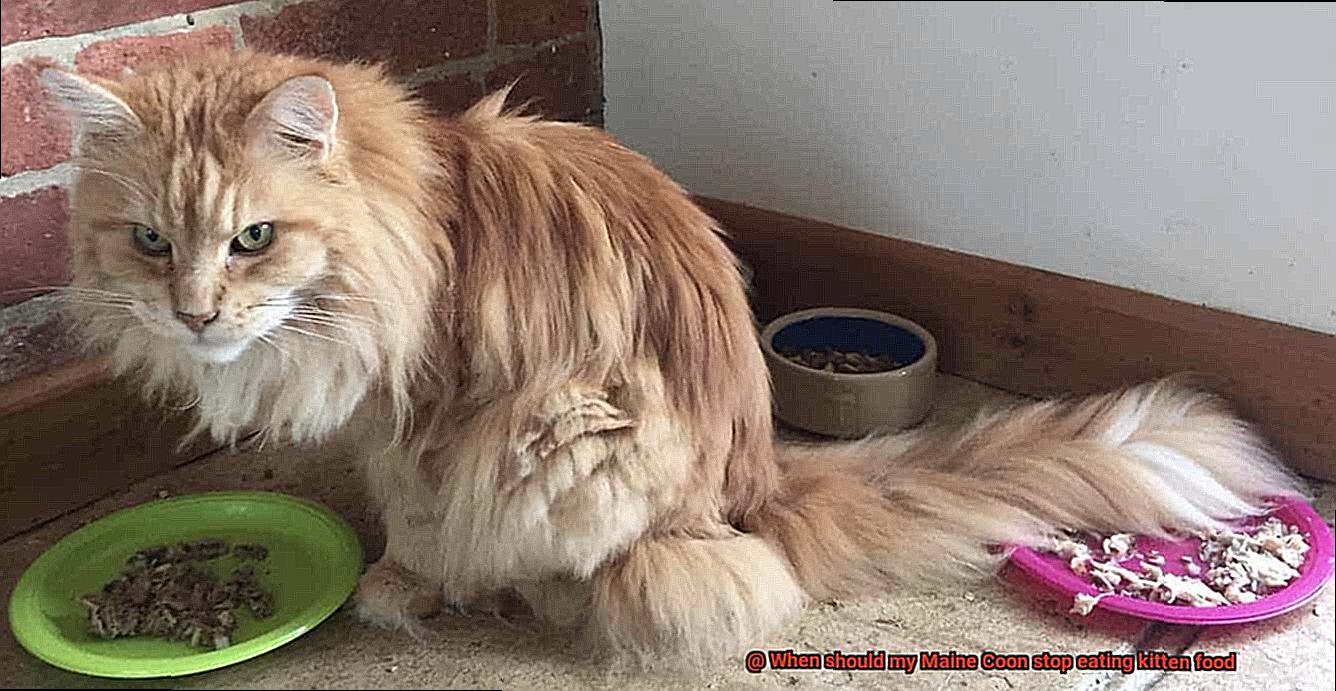
Congratulations. It’s time to start the process of transitioning your furry friend from kitten food to adult food. As someone who specializes in Maine Coon nutrition, I am thrilled to share with you five crucial steps to make this transition process a breeze.
Step 1: Determine the perfect timing
Most veterinarians recommend switching your Maine Coon from kitten food to adult food when they reach around 12 months of age. However, every cat is unique, so it’s essential to pay attention to your cat’s weight, activity level, and overall health. Consult with your veterinarian to determine the best time for your cat to make the switch.
Step 2: Keep an eye on your cat’s weight
When deciding if your Maine Coon is ready for adult food, it’s important to monitor their weight. If they are consistently gaining weight and maintaining a healthy body condition score, then they may be ready for adult food. Additionally, if your Maine Coon is becoming more active and playful, this may also be a sign that they are ready for adult food.
Step 3: Gradual transition is key
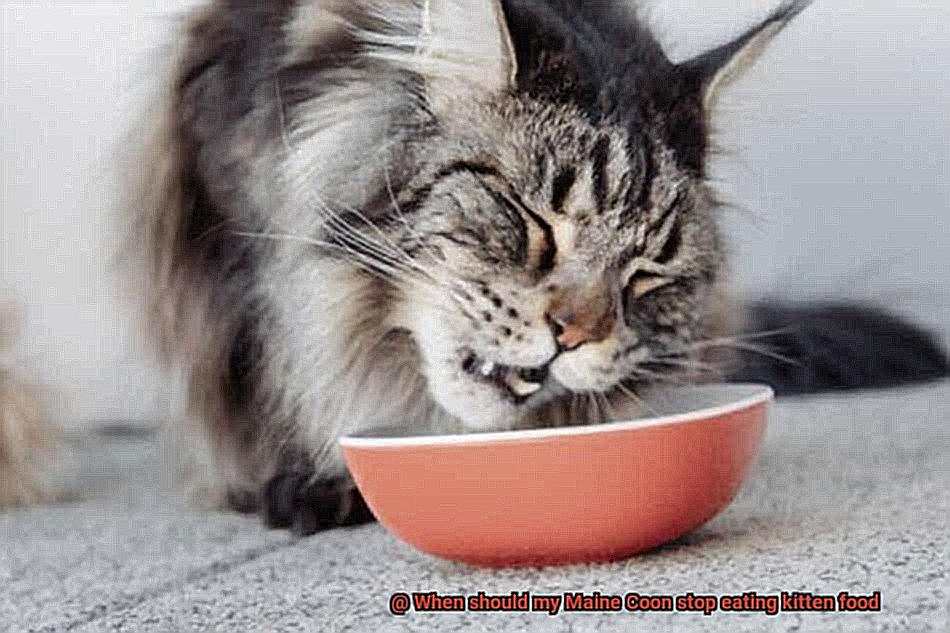
To prevent any digestive issues or stomach problems, it’s crucial to transition your Maine Coon gradually over a period of one to two weeks. Start by mixing a small amount of adult food into their kitten food and gradually increase the amount of adult food while decreasing the amount of kitten food. This will give your cat’s digestive system ample time to adjust seamlessly.
Step 4: Choose the perfect adult cat food
When selecting an adult cat food for your Maine Coon, look for one that is specifically formulated for large breeds. Since Maine Coons can weigh up to 25 pounds, they require a diet that supports their bone and joint health. A high-quality adult cat food that contains balanced protein, fat, and carbohydrates can help maintain your cat’s optimal weight and overall health.
Step 5: Keep an eye on behavior and appetite
During the transition period, it’s essential to monitor your Maine Coon’s behavior and appetite closely. Some cats may experience digestive issues such as diarrhea or vomiting during the transition period. If this happens, slow down the transition process or consult with your veterinarian for advice.
Potential issues when transitioning from kitten food to adult food
As your beloved Maine Coon grows and matures, it’s important to transition them from kitten food to adult food. However, this seemingly simple task comes with potential issues that you need to be aware of to ensure your feline friend’s overall health and wellbeing.
One of the main concerns is ensuring that the adult food you choose is nutritionally balanced and meets the needs of a growing Maine Coon. Make sure to select a high-quality, complete, and balanced adult cat food that is appropriate for your Maine Coon’s age, size, and activity level.
Another issue that may arise when transitioning to adult food is digestive upset. A sudden change in diet can cause problems such as diarrhea or vomiting. To prevent this, transition gradually over 7-10 days by mixing increasing amounts of the new adult food with decreasing amounts of the kitten food. This will allow your Maine Coon’s digestive system to adjust to the new food gradually.
In addition, some Maine Coons may experience weight gain or loss during this phase. Maine Coons are known for their large size and can be prone to obesity if overfed or not given enough exercise. Keep an eye on your Maine Coon’s weight and adjust their feeding accordingly to maintain a healthy body condition score.
Lastly, it’s important to note that Maine Coons have a slow growth rate and may not fully mature until they are 3-5 years old. Therefore, it may be beneficial to continue feeding a high-quality kitten food formulated for growth and development until they reach their full size and maturity.
IH7Wn0rOcEA” >
Also Read: How to Schedule Maine Coon Feeding?
Conclusion
In conclusion, transitioning your beloved Maine Coon from kitten food to adult food is a crucial step in their growth and development. It’s essential to keep a keen eye on your feline friend’s weight, activity level, and overall health before making the switch.
While most veterinarians recommend transitioning your Maine Coon to adult food between 12 to 18 months of age, it’s important to remember that every cat is unique and may require a shorter or longer transition period.
To make the transition as smooth as possible, it’s vital to do so gradually over a period of 7-10 days. This will help prevent any digestive upset or stomach issues that may arise.
When choosing adult cat food for your Maine Coon, be sure to pick high-quality options specifically formulated for large breeds like them. These should contain balanced protein, fat, and carbohydrates.
During the transition period, keep an eagle eye on your Maine Coon’s behavior and appetite closely. Some cats may experience digestive issues such as diarrhea or vomiting during this time. If this happens, slow down the transition process or consult with your veterinarian for advice.
By following these tips and monitoring your Maine Coon’s progress along the way, you can ensure that they are getting all the nutrients they need to support their growth and development during their early years.
Remember always to consult with your veterinarian before making any significant changes to your pet’s diet.







